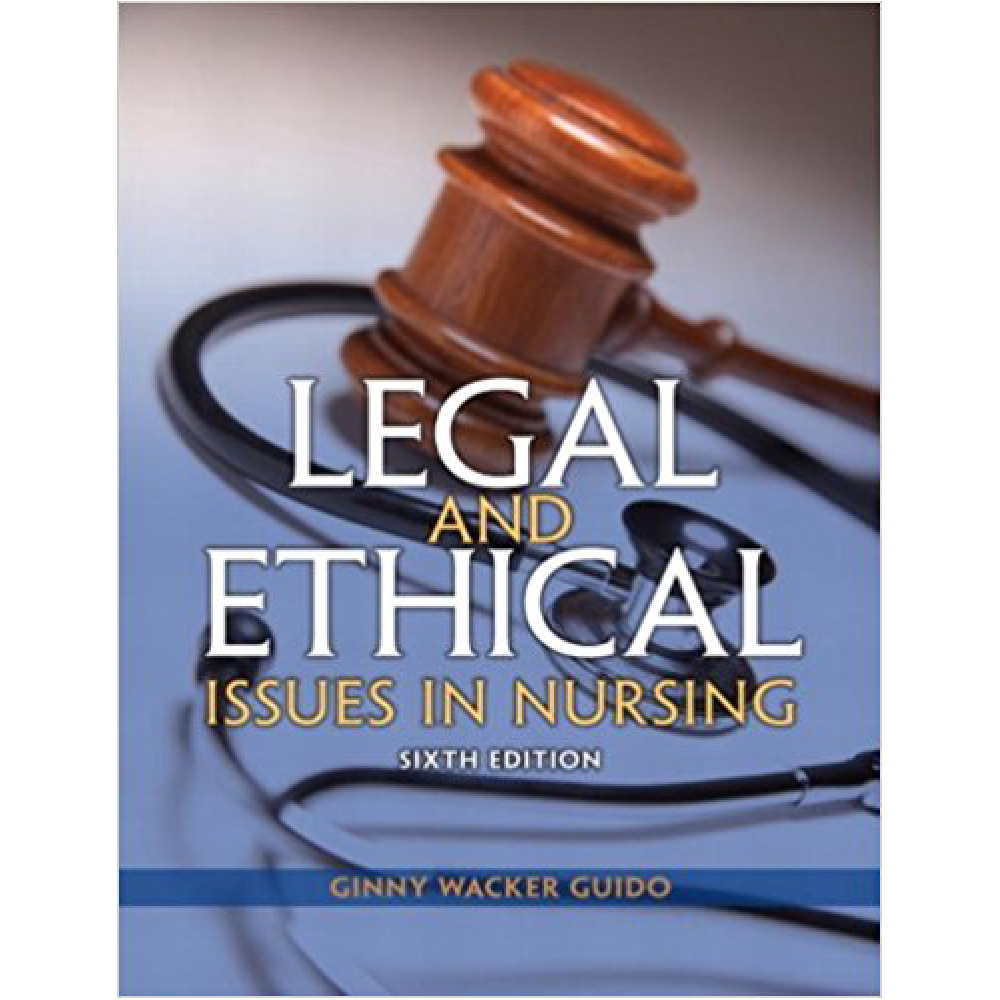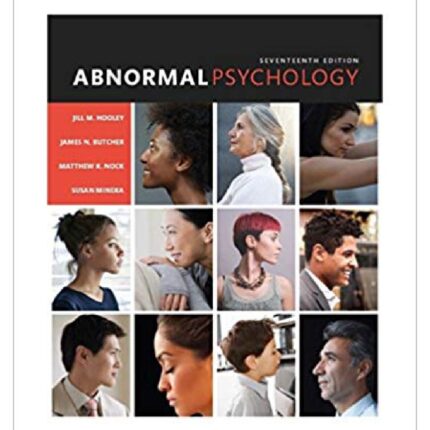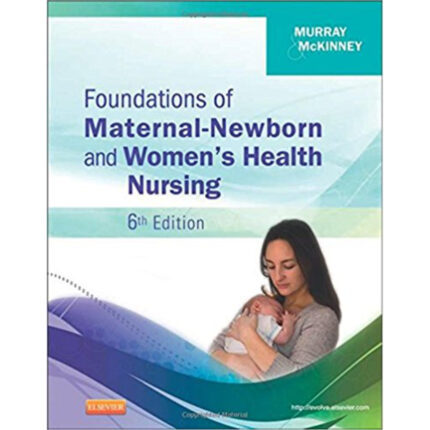Legal And Ethical Issues in Nursing 6th Edition by Ginny Wacker Guido – Test Bank
Chapter 11
Question 1
Type: MCSA
Changes to nursing licensure are being considered. The nurse identifies which source of the state’s power to license nurses?
1. Police power within the state
2. State and federal case laws
3. Constitution of the United States
4. Nurse practice act
Correct Answer: 1
Rationale 1: It is the states’ police power that enables them to provide a license for nurses.
Rationale 2: State and federal case laws may define actions that the state may take in certain circumstances, but they do not extend to providing licensure for nurses.
Rationale 3: The Constitution is a federal document that does not address licensing power of the states.
Rationale 4: The state practice act defines the scope of practices and the processes for licensure, not the power to issue the license.
Global Rationale:
Cognitive Level: Applying
Client Need: Safe Effective Care Environment
Client Need Sub: Management of Care
Nursing/Integrated Concepts: Nursing Process: Implementation
Learning Outcome: 11.1 Define licensure, including mandatory, permissive, and institutional licensure and the advantages and disadvantages of each.
Question 2
Type: MCSA
A medical technician working in a physician’s office routinely refers to herself as a nurse. Which type of licensure protects that title as well as the professional actions associated with nursing?
1. Mandatory
2. Institutional
3. Transitional
4. Permissive
Correct Answer: 1
Rationale 1: Mandatory licensure requires that all persons who are compensated as a member of a licensed profession obtain licensure prior to practicing actions of the profession. It protects both the title “nurse” and the professional actions associated with the nursing.
Rationale 2: Institutional licensure is the process by which a state government regulates health institutions and is an alternative to individual licensure. It does not protect individual practice or title.
Rationale 3: Transitional is not a term used to describe licensure in this text.
Rationale 4: With permissive licensure, nurses cannot use the title RN unless duly licensed, but can perform many or all of the same actions as long as they do not call themselves RN. So, permissive licensure regulates the use of the title, not the actions.
Global Rationale:
Cognitive Level: Analyzing
Client Need: Safe Effective Care Environment
Client Need Sub: Management of Care
Nursing/Integrated Concepts: Nursing Process: Implementation
Learning Outcome: 11.1 Define licensure, including mandatory, permissive, and institutional licensure and the advantages and disadvantages of each.
Question 3
Type: MCSA
A nurse appointed to the state board of nursing would expect work focused on which basic purpose of that body?
1. Establishing a means of protecting the public at large
2. Ensuring that all schools of nursing seek national accreditation
3. Ensuring that all practicing nurses are competent
4. Restricting nursing practice through regulations
Correct Answer: 1
Rationale 1: The main purpose of the state board of nursing is to protect the public.
Rationale 2: The state board of nursing may support this effort, but this is not the basic function of the board.
Rationale 3: Overseeing nurse competence is a way to support the board’s basic purpose.
Rationale 4: The state board may restrict nursing practice in order to support its basic purpose.
Global Rationale:
Cognitive Level: Applying
Client Need: Safe Effective Care Environment
Client Need Sub: Management of Care
Nursing/Integrated Concepts: Nursing Process: Assessment
Learning Outcome: 11.2 Describe the process for creating state boards of nursing and their authority, including limitations on their authority.
Question 4
Type: MCSA
A physician reported a case of possible nursing negligence to the state board of nursing. What action will be taken by the board?
1. The complaint will be screened and an investigation initiated if appropriate.
2. Nothing will be done as only another professional nurse is qualified to report nursing negligence.
3. The nurse or nurses will be placed on probation pending investigation of the complaint.
4. The incident will be recorded as a “first strike” against the nurse or nurses involved.
Correct Answer: 1
Rationale 1: A single complaint triggers action on the part of the board. The complaint is screened and an investigation is initiated, if appropriate.
Rationale 2: Any interested person can file a complaint with the board of nursing.
Rationale 3: There is no way to know if probation is necessary until an investigation is done.
Rationale 4: No action against the nurse is indicated until an investigation is completed.
Global Rationale:
Cognitive Level: Applying
Client Need: Safe Effective Care Environment
Client Need Sub: Management of Care
Nursing/Integrated Concepts: Nursing Process: Implementation
Learning Outcome: 11.2 Describe the process for creating state boards of nursing and their authority, including limitations on their authority.
Question 5
Type: MCSA
The hospital nurse supervisor has concerns that a staff nurse is no longer capable of competent patient care because of alcohol use. Repeated counseling sessions with the nurse have not changed the behaviors that are of concern. What action should be taken by the supervisor?
1. Report the concerns to the state board of nursing.
2. Terminate the nurse’s hospital employment.
3. Transfer the nurse to a non-patient care position.
4. Nothing as the nurse might sue the supervisor.
Correct Answer: 1
Rationale 1: Of the options provided, the one most protective of public safety is to report concerns to the state board of nursing.
Rationale 2: Simply terminating employment does not address the problem at the nurse’s level and does not guarantee that the nurse will not have similar issues at the next place of employment.
Rationale 3: Transfer of the nurse to a non-patient care position is only a temporary solution and does not address the safety issues. Nurses can make errors that impact the public, even in non-patient care roles.
Rationale 4: Ignoring the problem for fear of suit will not make the problem go away.
Global Rationale:
Cognitive Level: Analyzing
Client Need: Safe Effective Care Environment
Client Need Sub: Management of Care
Nursing/Integrated Concepts: Nursing Process: Implementation
Learning Outcome: 11.2 Describe the process for creating state boards of nursing and their authority, including limitations on their authority.
Question 6
Type: MCSA
The nurse is searching for the legal guide to the practice of registered nurse. Which document should the nurse review?
1. ANA Code of Ethics
2. State Nurse Practice Act
3. Nurse’s Bill of Rights
4. Nightingale Pledge
Correct Answer: 2
Rationale 1: The ANA Code of Ethics is the document that defines ethical principles for nurses.
Rationale 2: The state nurse practice act is the legal guide to define the scope of practice for nurses.
Rationale 3: The Nurse’s Bill of Rights are references to nurses’ rights, not specific legal aspects of nursing practice.
Rationale 4: The Nightingale Pledge is the nurses’ pledge or commitment to serving their patients derived from the writings of Florence Nightingale.
Global Rationale:
Cognitive Level: Applying
Client Need: Safe Effective Care Environment
Client Need Sub: Management of Care
Nursing/Integrated Concepts: Nursing Process: Assessment
Learning Outcome: 11.3 Describe the process of how state nursing acts define the professional scope of practice.
Question 7
Type: MCSA
A nursing student reports that her grandmother served as a nurse in World War II. At the end of the war, her grandmother was licensed as a nurse, even though she never graduated from nursing school. Which type of exemption from licensure does this reflect?
1. Grandfather clause
2. Reciprocity
3. Endorsement
4. Licensure by waiver
Correct Answer: 1
Rationale 1: The grandfather clause is a form of exemption that allows certain persons working within a given profession prior to a given deadline to apply for licensure without meeting all the requirements for that licensure. It was used to allow World War II nurses with on-the-job training and expertise licensure as a nurse.
Rationale 2: Reciprocity allows a person who has a license in one state to practice in another state if the states have an agreement to do so.
Rationale 3: Endorsement is similar to reciprocity but there is no prior agreement among the states.
Rationale 4: Licensure by waiver is similar to licensure by exam. If the person meets the exam requirements without taking the test, the exam is waived and a license is issued.
Global Rationale:
Cognitive Level: Applying
Client Need: Safe Effective Care Environment
Client Need Sub: Management of Care
Nursing/Integrated Concepts: Nursing Process: Assessment
Learning Outcome: 11.4 Describe entry into practice in relationship to state nursing practice acts.
Question 8
Type: MCMA
In which situations would the state board of nursing have probable grounds for disciplining a nurse?
Note: Credit will be given only if all correct choices and no incorrect choices are selected.
Standard Text: Select all that apply.
1. The nurse can no longer lift 30 pounds.
2. The nurse fails to report a co-worker who is working outside his scope of practice.
3. The nurse questioned a direct physician order.
4. The nurse made a false statement on the licensure application.
5. The nurse told a co-worker that she is taking antidepressant medications.
Correct Answer: 2,4
Rationale 1: Inability to lift 30 pounds may change where a nurse can safely work, but is not grounds for action against the license.
Rationale 2: Failure to report another person for fraudulent, incompetent, unprofessional, or unethical conduct is grounds for action against the non-reporter’s license.
Rationale 3: Questioning an order is not grounds for action against the nurse unless the questioning is done in an unethical or unprofessional manner.
Rationale 4: Making a false statement on the licensure application is grounds for action against the nurse’s license.
Rationale 5: If the nurse is seeking treatment for depression and the depression does not interfere with safe, competent nursing care there is no reason for disciplinary action.
Global Rationale:
Cognitive Level: Analyzing
Client Need: Safe Effective Care Environment
Client Need Sub: Management of Care
Nursing/Integrated Concepts: Nursing Process: Implementation
Learning Outcome: 11.4 Describe entry into practice in relationship to state nurse practice acts.
Question 9
Type: MCMA
A nurse executive has requested that additional budgetary funds be allocated to support staff seeking a baccalaureate degree in nursing or specialty certification. Which information should this executive provide during discussions of this funding?
Note: Credit will be given only if all correct choices and no incorrect choices are selected.
Standard Text: Select all that apply.
1. “Research shows no correlation between an increased number of BSN prepared nurses and increased nursing salaries.”
2. “Nurse specialty certification has been shown to lower patient mortality.”
3. “If our nursing staff is educated at a higher level and are certified we will see fewer lawsuits for negligence and malpractice.”
4. Higher failure-to-rescue rates
5. “Education at the BSN level, when coupled with specialty certification, has been shown to reduce adverse patient outcomes.”
Correct Answer: 2,4,5
Rationale 1: Typically nurses do receive salary increases as educational level increases.
Rationale 2: Kendall-Gallagher and colleagues (2011) concluded that hospitals’ nurse specialty certification lowers patient mortality.
Rationale 3: There is no evidence that this is the case.
Rationale 4: Higher rates of nurse specialty certification have been correlated with reduction of failure-to-rescue rates in hospital settings.
Rationale 5: Researchers have noted a reduction of adverse patient outcomes when specialty certification exists along with education at the BSN level.
Global Rationale:
Cognitive Level: Analyzing
Client Need: Safe Effective Care Environment
Client Need Sub: Management of Care
Nursing/Integrated Concepts: Nursing Process: Implementation
Learning Outcome: 11.5 Analyze the impact of education on nursing practice issues.
Question 10
Type: MCSA
The patient tells the nurse that the physician mentioned deep tissue massage as treatment for rheumatoid arthritis. As a part of the subsequent conversation, the nurse demonstrates techniques and encourages the patient to begin a regimen immediately. What is true regarding this situation?
1. Since back massage is a standard skill taught in nursing school, the nurse has no liability for these actions.
2. The nurse’s liability centers on the recommendation to begin a massage regime.
3. Since the physician initiated the discussion, the nurse has no liability.
4. This nurse may be guilty of practicing massage without a license.
Correct Answer: 4
Rationale 1: The nurse is responsible for all nursing actions.
Rationale 2: The recommendation itself would probably not be a liability issue if the nurse was educated to make such a recommendation.
Rationale 3: The nurse is responsible for all nursing actions.
Rationale 4: Deep tissue massage goes beyond the bedtime “backrub” type of massage taught in nursing school and is used for a specific disease therapy, so the nurse may be guilty of practicing massage without a license. States differ on this licensure.
Global Rationale:
Cognitive Level: Analyzing
Client Need: Safe Effective Care Environment
Client Need Sub: Management of Care
Nursing/Integrated Concepts: Nursing Process: Implementation
Learning Outcome: 11.6 Describe the legal ramifications of complementary and alternative medicine, including the medical use of cannabis (marijuana).













Reviews
There are no reviews yet.